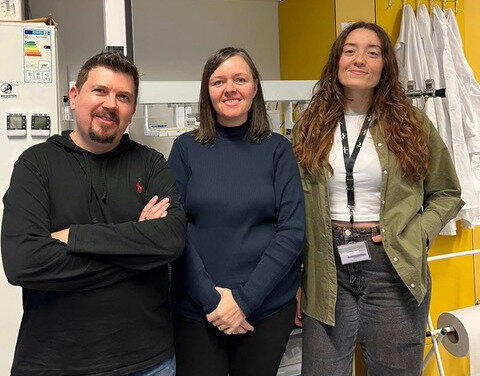Oral health, key to establishing new methods for diagnosing and preventing neurodegenerative diseases such as Alzheimer's
Proteins of bacterial origin from the oral microbiome have been identified for the first time within extracellular vesicles present in the human brain
A research team from Lleida has identified bacterial proteins in human brain tissue for the first time within small natural structures in our body called extracellular vesicles (EVs). This discovery provides new insights into the relationship between the oral microbiome and the brain and opens up a new channel of communication between microorganisms and the central nervous system. This is the finding of a study led by the +Pec Proteomics group at the Lleida Biomedical Research Institute (IRBLleida) and the University of Lleida (UdL), published in the journal Molecular & Cellular Proteomics.
'This finding opens up a new scientific perspective on how oral health can influence brain health and paves the way for the development of new methods for the diagnosis and prevention of neurodegenerative diseases such as Alzheimer's,' explained Xavier Gallart-Palau, one of the leaders of the +Pec Proteomics group.
Although several epidemiological studies had linked poor oral health with dementia and suggested the possibility that bacteria from the mouth could reach the brain directly, this theory had not been scientifically confirmed. 'Now, this research takes a decisive step forward in this line of inquiry by identifying, for the first time, proteins of bacterial origin within small natural structures in our body called extracellular vesicles, which have been found in human brain tissue,' added Gallart.
Extracellular vesicles are microscopic capsules that all cells produce to communicate with each other, transporting proteins and other molecules to different parts of the body. The study shows that these capsules can carry material of bacterial origin from the mouth to the brain, revealing a new channel of communication between the oral microbiome and the nervous system.
'Bacterial proteins circulate encapsulated in EVs in the blood and reach brain tissue, revealing a possible biological mechanism connecting the mouth and the brain,' explained Aida Serra, the other head of the +Pec Proteomics group. These extracellular vesicles of oral origin can cross the blood-brain barrier, as demonstrated by an advanced experimental model (blood-brain barrier-on-a-chip), and transport bacterial protein material to the brain. The research results were previously protected by a European patent to ensure transfer and potential development in diagnostic or therapeutic applications, as the study proposes extracellular vesicles as new natural vehicles for interspecies communication, with possible applications in precision medicine and new therapeutic strategies.
The study was led by Xavier Gallart-Palau and Aida Serra, with trainee researcher María Mulet as lead author. All three researchers are affiliated with the Lleida Biomedical Research Institute (IRBLleida) and the University of Lleida (UdL). The work involved collaboration with teams from the Foundation for the Promotion of Health and Biomedical Research of the Valencian Community (FISABIO), the Reina Sofía Alzheimer's Centre (Madrid), ), from the Faculty of Dentistry at the Complutense University of Madrid, the, CIBER-BBN, the Institute for Bioengineering of Catalonia (IBEC), and, at the international level, Newcastle University (United Kingdom).
The work has been supported by the Carlos III Health Institute, the Ministry of Science and Innovation, the Provincial Council of Lleida, AGAUR and the European NextGenerationEU programme.
Article: Mulet M, Sánchez Milán JA, Lorca C, Fernández-Rhodes M, Adrados-Planell A, Bejarano Castillo MC, Saiz L, Mateos-Moreno MV, Hase Y, Mira A, Rábano A, Ser TD, Kalaria RN, Lagunas A, Mir M, Crespo A, Samitier J, Gallart-Palau X, Serra A. Oral microbiome-derived proteins in brain extracellular vesicles circulate and tie to specific dysbiotic and neuropathological profiles in age-related dementias. Mol Cell Proteomics. 2025 Nov 12:101464. doi: 10.1016/j.mcpro.2025.101464. Epub ahead of print. PMID: 41237903.

The study was led by Xavier Gallart-Palau and Aida Serra, with trainee researcher María Mulet as lead author






